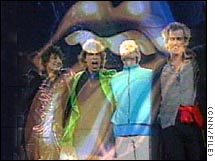 |
| What a drag it is getting old: The Rolling Stones have a top-selling album. But many media companies still don't target older consumers who grew up listening to the group. |
|
|
|
|
|
|
|
NEW YORK (CNN/Money) -
Media companies usually lust after young consumers.
But they may have finally discovered a little secret: People over the age of 50 spend a lot of money on DVDs and music and watch a lot of television as well.
Consider this. The top selling album on Amazon.com (Research) as of Sept. 14 was "A Bigger Bang" by sexagenarian rockers The Rolling Stones. Also in the top 10 best sellers: Paul McCartney, Bonnie Raitt, Neil Young and Eric Clapton.
Over on BarnesandNoble.com, the No. 2 selling DVD is "To Kill a Mockingbird," a movie that came out in 1962. And the No. 6 seller is "The Complete Thin Man Collection," the series of 1930s and 1940s films based on the Dashiell Hammett stories about husband and wife sleuths Nick and Nora Charles.
This isn't exactly the type of entertainment you'd expect text-message loving teens to be interested in. So will big media stop chasing the proverbial fountain of youth?
Probably not. But at the very least, major media companies do seem to have woken up to the fact that it's silly to ignore older consumers.
"There's not as much disdain for the older demographic as we saw five to ten years ago," said Ed Martin, programming editor with MediaVillage.com, an independent research site focusing on the television industry.
A big market
According to research from Age Wave, a San Francisco-based marketing firm that focuses on Baby Boomers, consumers over the age of 50 account for half of all the discretionary spending power in the United States.
"The media is waking up to the fact that this body of people is becoming more dominant and shouldn't be ignored," said Sharon Whiteley, CEO of ThirdAge Inc., an online media marketing and research company focused on older consumers. "If we are not marketed to sensitively, they will get less share of our pocketbook."
With that in mind, it shouldn't be a surprise that media company Viacom (Research) and cable giant Comcast (Research) are said to be in talks to create new lifestyle cable networks geared towards an older audience. Viacom already owns youth-oriented cable channels Nickelodeon and MTV.
"People used to assume that if you're old, you don't have money and therefore we won't market to you. But companies are now recognizing that boomers will be working and spending a lot more than their parents and grandparents," said Maddy Dychtwald co-founder and senior vice president, Maddy Dychtwald of Age Wave and author of "Cycles: How We Will Live, Work, and Buy."
And older consumers are becoming increasingly important to Hollywood since the industry is in a ticket sales slump this year. It may be tougher to entice older viewers to go see new releases at theaters but it doesn't appear to be difficult to convince them to buy their old favorites to watch at home.
"Studios are learning that they can tap into their film libraries and reap some pretty strong profits," said Gitesh Pandya, editor of movie research site BoxOfficeGuru.com. "The DVD is where studios can have more consistent success with older audiences since there is the nostalgia factor."
Still, not all types of media firms seem to be willing to cater to older customers.
Along those lines, radio company Infinity Broadcasting, also owned by Viacom, got rid of its "oldies" music stations in New York in Chicago and June, citing declining ratings. Infinity switched them to the "Jack" format, which have no on-air personalities and aim to mimic the randomness of popular digital music players like the iPod in shuffle mode.
But satellite-radio firm Sirius Satellite Radio (Research) quickly signed up one of the most popular "oldies" DJs, Bruce "Cousin Brucie" Morrow, formerly of WCBS in New York, to host weekly shows on its 60s music channel.
Elise Brown, a spokesperson for Sirius, said that despite the changes going on in terrestrial radio, Sirius believes that older listeners are a group that's worth catering to. "We felt this is an audience that we can serve," Brown said. She declined to say if there was a noticeable increase in subscribers because of the addition of Cousin Brucie, however.
But Age Wave's Dychtwald added that companies who ignore Baby Boomers because they believe that older consumers are afraid of new technologies like satellite radio are making a big mistake. "People over the age of 50 are willing to try new products," she said. "Boomers embrace new technology quicker than any other generation because they have the money."
She said that media companies have come a long way and thinks that the music industry has been the quickest to realize that older artists still have a lot of appeal, not to just Boomers but the kids of them as well. But she said that media firms still could do a better job of trying to reach out to an attractive audience that has the money and desire to spend on entertainment and leisure.
"There is a new kind of vision of what people like over 50 can be like and it is even beginning to infiltrate the media," she said. "But is it where it should be? No way."
For a look at media and entertainment stocks, click here.
What's Hollywood's biggest problem? Click here to find out.

|